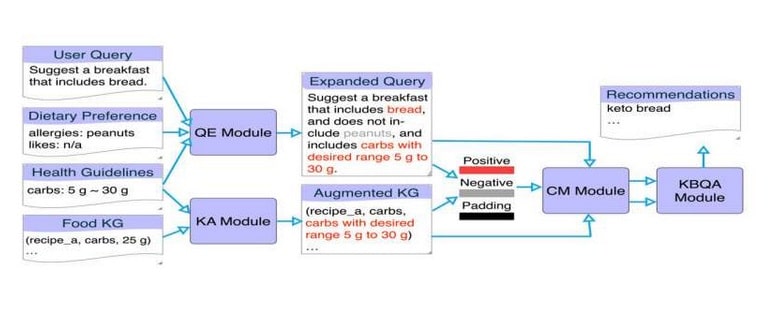Researchers at Rensselaer Polytechnic Institute and IBM Research in New York have recently created pFoodReQ, a system that can recommend recipes tailored around the preferences and dietary needs of individual users. This system is outlined in a paper pre-published on arXiv and set to be presented at the 14th International Conference on Web Search and Data Mining (WSDM) in March.
“Our work focuses on personalized food recommendation,” Mohammed J. Zaki, one of the researchers who developed the system, told TechXplore. “In particular, given a user query in natural language, we want to retrieve the top matches in a recipe dataset.”
The short-term goal of the study carried out by Zaki and his colleagues was to help people find healthy recipes that satisfy both their dietary needs and inclinations. Ideally, they wanted these recipes to reflect both a users’ intent (i.e., whether they are planning a quick or more elaborate meal), their preferences (i.e., whether they like or dislike specific ingredients or cuisines), dietary constraints (i.e., if they are allergic or intolerant to certain products) and health status (i.e., if they are diabetic, overweight, or have specific health conditions).
“The key idea is that given the same query, the response should actually be different for different users,” Zaki said. “In other words, the responses should be personalized. This is a very challenging task, especially in terms of determining the implicit constraints that are actually relevant to the query.”
A broader objective of the research by Zaki and his colleagues was to combine machine learning methods with semantics, the branch of linguistics related to meaning. To do this, the researchers combined deep-learning techniques for answering questions with FoodKG, a large-scale food knowledge graph they developed. The FoodKG graph, which is publicly available online, contains over 67 million records (or triples). These records include approximately one million recipes, graph representations of the relationships between these recipes and the ingredients required to complete them, as well as data related to the properties of ingredients, nutrient contents and different cuisines or food categories.
“Our framework has a number of unique advantages compared to existing works focusing on food recommendation,” Zaki explained. “First, our aim is to cast the personalized recipe recommendation task as question answering in natural language, for ease of use. Second, our system can handle explicit requirements that mention food tags (e.g., Italian dishes) and allowed ingredients (e.g., must contain spinach), as well as negations (e.g., should not contain walnuts).”
READ more: Researchers develop a system that can recommend personalized and healthy recipes
